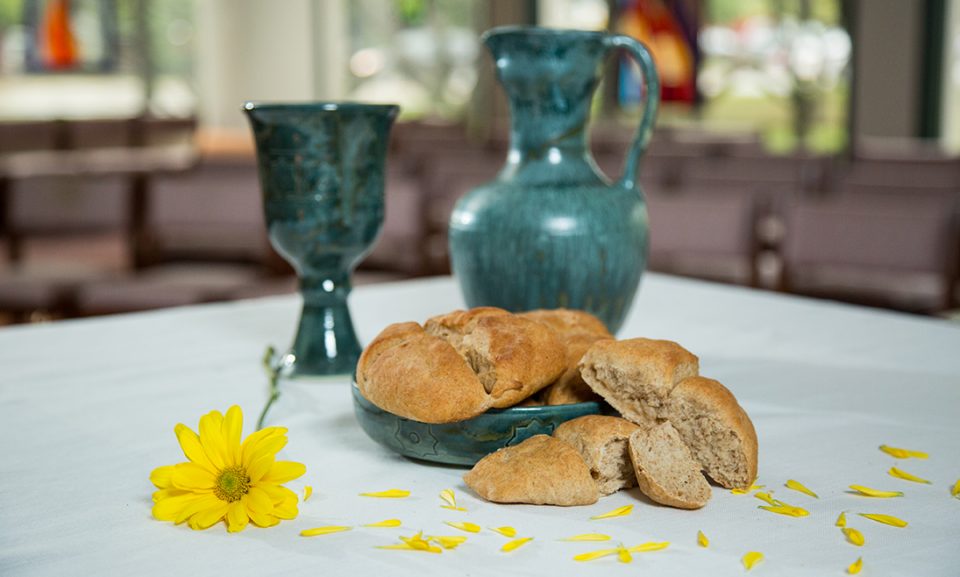Editor’s note: This article is the second in a four-part series exploring the relevance of Martin Luther’s catechism for our lives today.
“What is the benefit of such eating and drinking? The words ‘given for you’ and ‘shed for you for the forgiveness of sin’ show us that forgiveness of sin, life, and salvation are given to us in the sacrament through these words, because where there is forgiveness of sin, there is also life and salvation,” writes Martin Luther in his Small Catechism.
We Americans are a finicky lot. We like things to be given to us, but we also like to think that we somehow earned them. Even the gifts we receive are often based on merit—think participation trophies, merit badges, work bonuses (remember those?) and a myriad of other honor-roll type tchotchkes. Our culture values rugged individualism and a bootstraps mentality. We don’t like admitting that sometimes we need mercy to get by.
This is why the celebration of Holy Communion is a subversive act for the 21st century. When Jesus first gave us the gift, it ran contrary to the Jewish prohibition of so many things—the consumption of blood, forgiveness without sacrifice, not to mention the mere thought of consuming non-kosher human flesh. Nowadays, we Lutheran folks understand the sacrament according to the teachings of Martin Luther and our emerging picture of God’s grace.
And this developing understanding of grace is what makes the act of celebrating the wine and bread so counter-cultural. We’re not in it to win it. We’re not asked to somehow prove our mettle in front of a scowling panel of judges. We’re not required to vote others off the island in order to gain access to the gift. If anything, the radical inclusivity of grace that is offered to us through this gift means we ought to be building bigger tables and tearing down walls. The sacrament of the altar, unlike other gifts, is an unlimited resource for us to steward with a spirit of contrition, joy and hospitality.
We baptize, eat, drink and proclaim the Word in order to realize God’s kingdom already in our midst. Our human brokenness makes this task impossible in this lifetime, but the gift of forgiveness at the table sanctifies us for the task at hand and infuses joy into our lives.
By means of contrast, consider social media and the role it plays in our culture. We “friend” or follow people whose general outlook on the world is most similar to our own, and when that buddy from high school whose political ideology is different from ours shows up on the screen, we all too often go after them, hammer and tongs, until eventually someone pulls the trigger and blocks the other: another futile argument, another wall created. This is not what Jesus had in mind for the church community.
The church gathering around font, table and pulpit is a church seeking to live out the gift of grace by creating a community that mirrors God’s intentions for creation. We baptize, eat, drink and proclaim the Word in order to realize God’s kingdom already in our midst. Our human brokenness makes this task impossible in this lifetime, but the gift of forgiveness at the table sanctifies us for the task at hand and infuses joy into our lives. Perhaps this is why we call it a “foretaste of the feast to come.”
I am writing this article from Camp Luther near Conneaut, Ohio, created by Finnish Lutherans of the Suomi Synod in 1948 to offer a place apart where God’s people could gather as extended families for renewal and discernment. (It boasts of having had Bishop Elizabeth Eaton—now ELCA presiding bishop—as a camper a few years back). It’s not a perfect place or community, but it is the closest thing to God’s intended creation that I have ever experienced.
At the end of the week, when we are tired and sunburned and emotionally fragile, Christ comes to us and offers forgiveness in a piece of bread and a sip of wine, and we are sent to share this grace in our daily living.
In this space we learn to live, work, play and dine in community. The ordinary moments of the day are made more sacred by our heightened awareness of God’s redemptive and creative power in our midst. The laughter is contagious and the tears are willingly shared.
At the end of the week, when we are tired and sunburned and emotionally fragile, Christ comes to us and offers forgiveness in a piece of bread and a sip of wine, and we are sent to share this grace in our daily living. Perhaps you have a place apart where you experience this sacramental moment. Hopefully, it is in your home congregation. It is a place where we take the so-called sacrament of the culture and turn it on its head, introducing the radical concept that all of creation is connected, cherished and redeemed.





